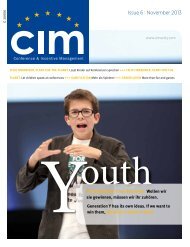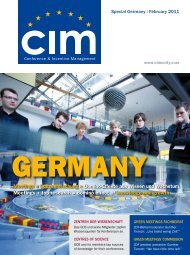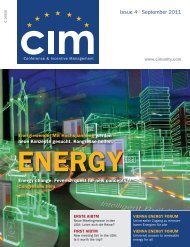Seminare: Storno ohne Risiko - CIM
Seminare: Storno ohne Risiko - CIM
Seminare: Storno ohne Risiko - CIM
Erfolgreiche ePaper selbst erstellen
Machen Sie aus Ihren PDF Publikationen ein blätterbares Flipbook mit unserer einzigartigen Google optimierten e-Paper Software.
GERMANY GCB<br />
„Technologisch Weltmeister“<br />
Dr. Martin Hoppe-Kilpper, Leiter des Kompetenznetzwerks Dezentrale Energietechnologien<br />
(deENet e.V.) in Kassel, zum Potenzial erneuerbarer Energien.<br />
■ <strong>CIM</strong>: Haben Sie damit gerechnet, dass Ihr Kongress „100<br />
Prozent Erneuerbare Energie Regionen“ im Juni 2009 ein so<br />
großer Erfolg sein würde?<br />
Dr. Hoppe-Kilpper: Unsere Erwartungen sind weit übertroffen worden.<br />
Dass rund 500 Teilnehmer aus Verwaltungen, Politik, Wirtschaft<br />
und Wissenschaft zum Kongress nach Kassel kamen, zeigt<br />
eindrucksvoll, dass das Thema auch in den Regionen angekommen<br />
ist und ein großes Bedürfnis nach fachlichem Austausch besteht.<br />
Inwiefern können erneuerbare Energien die regionale Wirtschaft<br />
stärken und zur Wertschöpfung beitragen?<br />
Regionale Energiewirtschaft kann in hohem Maße zu neuen Einkommens-<br />
und Beschäftigungsmöglichkeiten bis hin zu kommunalen<br />
Einnahmen in Form von Gewerbesteuer beitragen. Dies lässt<br />
sich am Beispiel einer Windenergieanlage mit einer Leistung von<br />
“Technology world champion”<br />
■ <strong>CIM</strong>: Did you expect the convention you held in June<br />
2009 on the potential for producing renewable energy at<br />
the local and regional level to be such a big success?<br />
Dr. Hoppe-Kilpper: Our expectations were greatly exceeded. The fact<br />
that around 500 delegates came – civil servants, politicians, business<br />
people and scientists – provided an impressive demonstration that the<br />
issue is also being tackled at the regional level and that there is a great<br />
need for an exchange on the subject.<br />
To what extent can renewable energies strengthen<br />
regional economies and generate value and revenue?<br />
Regional energy production can make a big contribution by providing new<br />
sources of income, creating new jobs and boosting local business tax<br />
revenues. This can be illustrated easily using the example of a two<br />
megawatt wind farm: This wind farm costs around 1.8m euros and<br />
generates revenues from electricity of around 360,000. The local<br />
authority gets 10,000 euros in local business tax, the landowner gets rent<br />
of 12,000 and local service companies earn around 40,000 euros for<br />
maintenance operating services. That’s all money that stays in the region.<br />
What core competences does Germany have in environmental<br />
technologies?<br />
Germany is the world champion when it comes to renewable energy<br />
technology. We are the leaders in solar, wind and bioenergy technology.<br />
It’s really important that our industry can demonstrate its outstanding<br />
zwei Megawatt einfach verdeutlichen: Diese WEA kostet rund 1,8<br />
Mio. Euro und erzielt für den Betreiber Stromerlöse von rund<br />
360.000 Euro. Die Kommune profitiert mit jährlich 10.000 Euro Gewerbesteuer,<br />
der Grundstückseigner mit einer Pacht von 12.000 Euro<br />
und örtliche Dienstleister mit rund 40.000 Euro für Wartungs-<br />
und Betriebskosten. Alles Geld, das in der Region bleibt.<br />
Welche Kernkompetenz hat der Standort Deutschland in<br />
Umwelttechnologien?<br />
Im Bereich der Erneuerbaren Energien ist Deutschland technologisch<br />
Weltmeister. Wir sind mittlerweile führend bei der Solar-,<br />
Wind- und Bioenergie. Ganz wichtig dabei ist, dass unsere Industrie<br />
ihre technisch hochwertigen Produkte hier auf heimischen Märkten<br />
demonstrieren kann. Nur Techniken, die man selbst entscheidend<br />
nutzt, kann man glaubwürdig international vertreiben.<br />
Dr Martin Hoppe-Kilpper, chief executive of Kassel-based Kompetenznetzwerk Dezentrale<br />
Energietechnologien (deENet e.V.), on the potential of renewable energies.<br />
technology here in domestic markets first. Only technologies used to<br />
decisive effect at home can be credibly marketed abroad.<br />
What clusters of excellence exist in the Kassel region?<br />
Regionalmanagement Nordhessen, the organisation to which Kompetenznetzwerk<br />
Dezentrale Energietechnologien belongs, also has two<br />
further clusters that set our region apart. Besides deENet, measures are<br />
also being implemented and coordinated centrally in the mobility<br />
industry and the tourism/wellness/health cluster to strengthen growth<br />
and employment in the North Hesse region.<br />
What role do events play in your segment?<br />
Much of the work we do in our network takes place at events. Lectures,<br />
forums and workshops are a frequently used channel of communication<br />
in the field. Good networking depends critically on a personal exchange<br />
between researchers, politicians and business people.<br />
Are your own events sustainable?<br />
Our own events should be as climate-friendly as possible. At the first<br />
renewable energy convention, price reductions were offered to those<br />
travelling by rail. Free use of public transport in the host city should go<br />
without saying. Moreover, Kongress Palais Kassel, where the second<br />
100% Erneuerbare Energie-Regionen convention is taking place from<br />
29 to 30 September 2010, is the first convention centre in Germany to<br />
get Green Globe certification for sustainability.<br />
10 cim 1/2010 Germany





